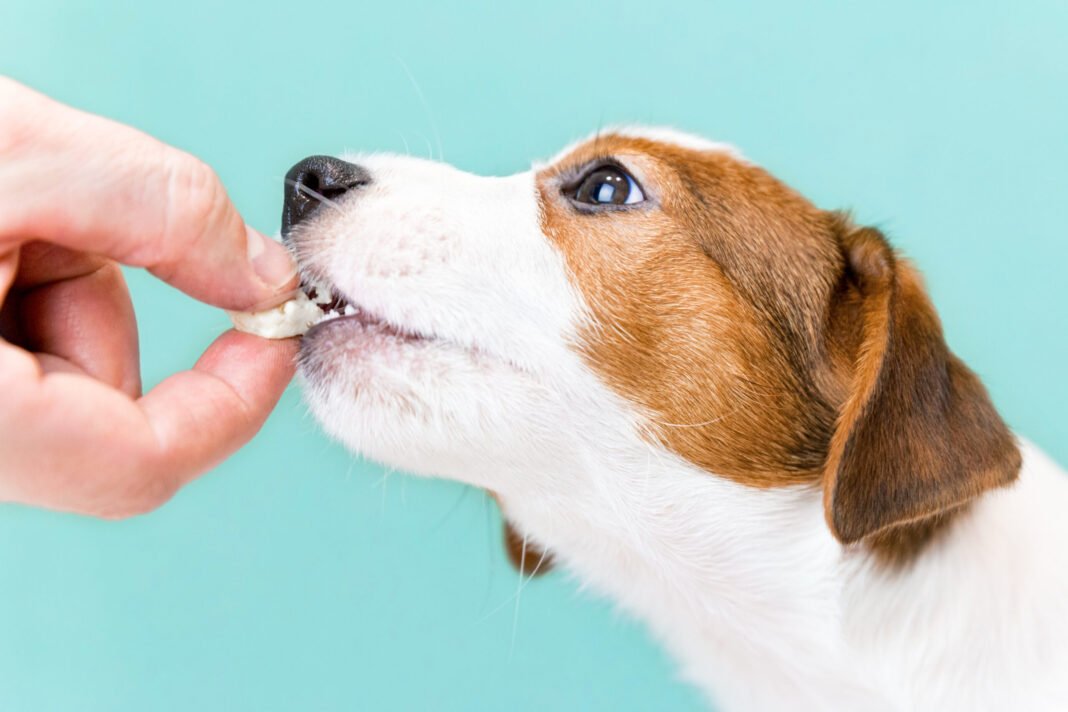Humans love to eat cheese, and it’s no secret that when we eat it, our dogs give us their best puppy dog looks! However, is cheese healthy for dogs to eat? Our dogs find it is better than the sliced bread. However, many dogs do not like the taste of the cheese. There are certain types of cheese that are safe for dogs. Keep reading to find Can Dogs Eat Cheese and what kind of cheese will be accepted!
Benefits of cheese for dogs
Protein, calcium, vitamin A, B vitamins, and vital fatty acids are all found in cheese. For dogs who are treat-motivated, trainers frequently utilize cheese because most dogs love it. This snack is a good way to hide in a dog medicine.
Is Cheese Bad for Dogs?
So can dogs eat cheese? Or is it always taboo? Sharing cheese with your dog may have certain advantages, but the reality is that it can also lead to a number of health issues, including pancreatitis and obesity. The ASPCA states that “Because pets do not contain significant amounts of lactase (the enzyme that breaks down lactose in milk), milk and other dairy products cause diarrhea or other digestive upset in pets.” Although the cheese seems harmless, it can cause serious tummy problems. In addition to the lactose issue, another problem with cheese for dogs is its high fat content. The regular diet of your dog’s fatty food can lead to the acquisition of an unhealthy weight and can even cause obesity, which, in turn, can cause other health problems.
According to the American nursery, the nutrition of cheese can cause pancreatitis, in particular for races subject to pancreatitis, such as schnauzers and the cocker spa. Pancreatitis is a serious illness that often causes upset stomach, diarrhea, and abdominal pain, and in severe cases can be fatal.
Read More: Why Do Dogs Lick Their Paws | What Kills Worms In Dogs Instantly
Can Dogs Eat Cheese for training
Many dogs have an irresistible love for cheese, making it a great high-value reward when training your pet. A high-value reward is one that communicates to your dog that you are very happy he or she has demonstrated the behavior you requested, so use it sparingly. For example, if your dog has difficulty recalling but finds cheese tasty, giving him a small piece of cheese when he comes to you when called will help him learn good thing. People use small cubes of cheddar cheese or cheese in a tube to train dogs at our rehoming centers. Putting a tube of cheese inside a Kong makes a great calming treat for your dog, especially if you want to calm him down for a while or if you are dealing with separation anxiety.
Read More: How To Get Rid Of Worms In A Dog Without Going To The Vet
Which cheeses are unsafe for dogs?
It’s best to stay safe and keep your pet away from blue cheeses like Stilton. Dogs may be susceptible to roquefortine C, a chemical produced by the fungus that makes these cheeses. This substance can cause vomiting, diarrhea, high fever and even seizures – if your dog eats large amounts of cheese, they are at increased risk of these conditions. If you notice one of these after your dog has eaten blue cheese, call your veterinarian urgently. Cheeses rich in mold can cause vomiting and diarrhea, especially if your pet eats a lot.
In what conditions dogs shouldn’t eat cheese
There are various conditions when cheese can be very harmful for the dogs:
- Overweight dogs: Cheese is high in fat, so avoid it for dogs who need to lose a few pounds (or more!). Low-fat alternatives for training treats include chicken, ham and tuna.
- Lactose intolerant: Dogs that have allergies or intolerances to dairy products should not eat cheese at all.
- Upset stomachs. If your dog find it uncomfortable after eating something which is not part of their ordinary diet, it is better not to allow them to have cheese, as it can cause disease or diarrhea.
- Kidney problems: Many cheeses are high in salt and therefore not very good for dogs with kidney disease.
Read More: Is Turmeric Good For Dogs | Husky Dog Price in India | Shih Tzu Price In India
Five types of cheese that are safe and allowed for your dogs
Here are the types of cheese that you can feed to your dog without any worries:
- Mozzarella
Mozzarella is a common cheese you can find in the market today. It contains high nutritions such as vitamins A and D. Mozarella can be a good source of calcium because it contains 18.3 mg of calcium per 1 ½ ounce. It also contains phosphorus, potassium, proteins and sodium.
- Cheddar
A common cheese found in practically every recipe is cheddar. It contains some lactose, which makes it ideal as a treat for your dogs. Additionally, it is a good source of calcium, protein, potassium and zinc.
- Gouda
Gouda cheese is known as a good source of protein and a good source of calcium. It also contains high amounts of zinc. However, this cheese can cause diarrhea in dogs, but is safe in moderate amounts.
- Swiss
Swiss cheese contains moderate amounts of vitamin A and vitamin D, and is also rich in calcium and phosphorus.
- Feta
Feta cheese is made from sheep, goat or cow’s milk and has a strong salty flavor. It usually has a crumbly white texture and is shaped like a ball. This type of cheese can help improve your dog’s mood and reduce anxiety. It contains a high amount of calcium, 19.5 mg per 1 ½ ounce cheese.
Types of Cheese to Avoid Feeding Dogs
Certain types of cheese can be dangerous for your dog’s health. Avoid giving the below listed cheese to your dogs:
- Cheese with Various Preservatives
It is best not to feed your dog cheese with garlic or other herbs, as this can cause stomach upset, diarrhea, and vomiting in dogs. Similarly, it is best to avoid feeding your dog cheese that contains toppings, preservatives such as nitrates, or processed ingredients. These types of cheese are not suitable for dogs as they contain ingredients that can be toxic to them. Some dogs may prefer unpasteurized cheese. However, you should know that this product is not suitable for them, especially if they are older, because it contains Listeria, a bacteria that poses a threat to your dog’s health.
- Blue Cheese
There is a lot of question about “Can Dogs Eat Cheese that is blue coloured?” In fact, it is dangerous to feed it to dogs. They run the danger of being ill from the mold that is actually utilized to make blue cheese. The reason is that dogs lack the enzymes necessary to digest blue cheese, which can cause diarrhea and vomiting.
Conclusion
As a dog owner, you want to do the best thing for your dog. Discuss with the veterinarian if you are confused about Can Dogs Eat Cheese?. There are some cases when the cheese can be beneficial for the dogs but many times cheese can be highly dangerous for the dogs.
Read More: Pomeranian Dog Price | Labrador Puppy Price | Top 20 Popular Dog Breeds





